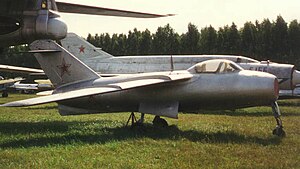| La-15 | |
|---|---|
| La-15 at Monino | |
| Role | Fighter |
| Manufacturer | Lavochkin / GAZ-21 |
| First flight | January 8, 1948(Aircraft 174) |
| Introduction | 1949 |
| Retired | 1954 |
| Primary user | Soviet Air Force |
| Number built | 235 |
| Developed from | Aircraft 174 |
Contents
|
Development
The La-15 was the outcome of a series of development aircraft that began with Aircraft 150 in 1945 and culminated in Aircraft 176, later in 1948. They were designed for British engines Rolls-Royce Derwent V and Nene, acquired by the Soviets in 1947 and then copied by them as RD-500 and RD-45 respectively. The Derwent-powered Aircraft 174 was designed as a backup for the main program, the Nene-powered Aircraft 168, in case the British failed to deliver more powerful Nene engines with afterburners, (which they did fail to deliver). The first prototype of Aircraft 174 was flown just 9 days after its Mikoyan-Gurevich counterpart I-310, on January 8, 1948. The first prototype was however lost on May 11, 1948 due to vibrations. Trials were continued with an improved second prototype, designated Aircraft 174D, which underwent State Acceptance Tests from August to September 25 1948. In comparison with the Nene-powered MiG-15 it had almost the same maximum speed and better maneuverability, with somewhat reduced rate of climb. The type was ordered into production in September 1948, even while Aircraft 174D was undergoing flight trials, and given the official designation La-15 In April 1949.The La-15 had a barrel-like fuselage, shoulder-mounted swept wings with 6 degrees anhedral, and stabilizers mounted high on the fin, almost like a T-tail. It was popular with pilots because of its easy handling and reliability, and its pressurized cockpit was an advantage at high altitude. Nevertheless, official enthusiasm for the La-15 was mild, largely because it was a complex design that required complicated and expensive production tooling. The Soviet authorities decided to produce only one fighter, and they chose the MiG-15bis because it was somewhat easier to mass-produce.
235 La-15s were built, and served with the Soviet Air Force until 1954. Although it had a number of technical advantages over the MiG-15, a combination of easier manufacture and lower costs, led to the MiG-15 being favoured.
Variants
- Aircraft 174 - Rolls-Royce Derwent powered first prototype of La-15. Crashed due to structural vibrations caused by sympathetic resonant frequencies of tailplane and rear fuselage.
- Aircraft 174D - (Dooblyor-second)- Second prototype with modifications shown to be required from Aircraft 174's flight tests.
- Aircraft 180 - A two-seat trainer version was also developed as Aircraft 180 and was to be put into production as the UTI La-15 or La-15UTI, but as official interest in the La-15 waned, the trainer was cancelled before mass production began and only 2 were made.
Operators
Specifications (La-15)
Data from *Gordon,Yefim. Lavochkin's Last Jets. Midland Publishing. Hinkley. 2007. ISBN(10) 1 85780 253 3
General characteristics- Crew: one
- Length: 9.56 m (31 ft 4 in)
- Wingspan: 8.83 m (29 ft 0 in)
- Height: 3.8 m (12 ft 5-39/64 in)
- Wing area: 16.167 m² (173.83 ft²)
- Empty weight: 3000 kg (6,500lb)
- Loaded weight: 3,800 kg (8,490 lb)
- Powerplant: 1× Klimov RD-500 turbojet, 15.6 kN (3,495 lbf)
- Maximum speed: 1,026 km/h (554 kn, 638 mph)
- Range: 1,170 km (632 nmi, 730 mi)
- Service ceiling: 13,500 m (44,290 ft)
- Rate of climb: 31.7 m/s (6,240 ft/min)
- Wing loading: 238 kg/m² (48.7 lb/ft²)
- Thrust/weight: 1:2.4 (4.1 N/kg)
- 3 × 23 mm Nudelman-Suranov NS-23 cannon



No comments:
Post a Comment